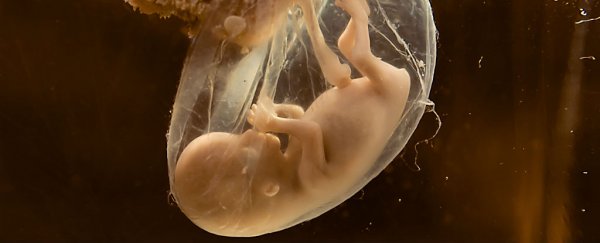It's estimated that 10 percent of pregnancies result in serous complications that can lead to premature births and conditions such as pre-eclampsia - where the mother can experience high blood pressure and fluid retention than can seriously affect the baby's growth.
Many complications that occur during pregnancy have been linked to a malfunctioning placenta, that for a variety of reasons fails to deliver the right amount of nutrients, or cannot maintain a consistent environment for the foetus.
And because of this extremely delicate environment, there's been very little that can be done within the womb to address this - until now. An international team of researchers has announced that, for the first time, they've figured out how to deliver drugs to the placenta that can actively bolster its function.
Strangely enough, the team achieved this by treating the placenta kind of like a tumour, as creepy as that sounds.
"Placentas behave like well-controlled tumours. They grow quickly, produce growth hormones and evade the immune system," said lead researcher Lynda Harris from the University of Manchester in the UK.
"A lot of cancer research focuses on finding ways of delivering drugs to kill the tumour without affecting the rest of the body," she adds. "We had the idea that if we could selectively target the placenta in the same way, we could deliver other drugs to help improve placental function and therefore treat pregnancy complications."
With this in mind, Harris and her team decided to see how the placenta would respond to two tumour-targeting peptides called CGKRK and iRGD, which are chains of amino acids that can be fashioned into minuscule drug-carrying capsules.
In experiments with pregnant mice, they found that just as these peptides are able to zero in on a tumour and deliver cancer-fighting drugs to the site, they were also able to target the placental tissue, and deliver a growth hormone that improved the organ's function.
While the growth hormones appeared to have no affect on normal-sized mouse foetuses, foetuses that were abnormally small due to malfunctioning placentas were shown to grow in response to the hormone.
"Given the current drug drought in obstetrics, a targeted therapy that promotes the growth of the smallest babies without inducing overgrowth of those that are developing optimally fulfills an important clinical need that is currently unmet," the researchers note in the journal Science Advances.
When the peptides were tested on human placental tissue, they were shown to bind to the cells and penetrate their membranes, which suggests that the same results could be replicated in human trials in the future.
The team reports that no traces of the drug were found in the foetuses themselves or the mother's organs after they'd had time to take effect.
The one big caveat is that the treatment could be risky for mothers with undiagnosed cancers, because the peptides wouldn't know which to target - the placenta or the tumour, but the team says this could be overcome with proper screening.
Right now, there are no medications available to treat a poorly functioning placenta, so if doctors detect that a baby is not growing as it should, the only option is to induce delivery and hope that things work out okay. But the risks associated with premature birth are significant, including susceptibility to infection and cerebral palsy early on, and heart disease and diabetes later in life.
"Only one drug for use during pregnancy has been licensed in the last 20 years," says Harris. "By developing this platform, we have opened up the possibility that any number of new drugs can be adapted and then used safely to treat common and serious pregnancy complications."
